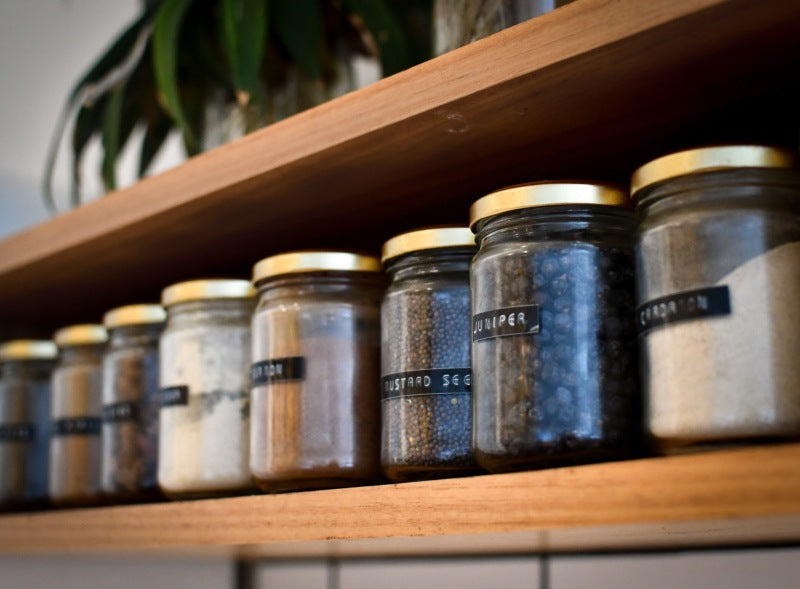Kitchen without plastic – how to introduce less waste principles in the kitchen
Contents:
- Shop smart and store food properly
- Shopping for your own bags and containers
- Kitchen items made from natural materials
- Let us not choose disposable products
- Let's not throw away food
Reducing plastic use and waste production, and not wasting food—these are all the fundamentals of the zero- and less-waste lifestyle. More and more people are hearing about these environmental movements, which are committed to protecting the natural environment. It's also about not wasting and throwing away food and how to store it properly. Where do we start if we want to implement zero-waste rules in the kitchen? Here are some practical tips.
Shop smart and store food properly
One of the fundamental principles of a zero-waste kitchen is proper product storage. Instead of buying bread in a plastic bag, buy it from the bakery and immediately pack it in cotton or, even better, linen bags, which are perfect for storage. Loose products, such as pasta , flour, rice, or groats, should be stored in glass and labeled jars to prevent moth infestation and prevent food from ending up in the trash. When buying rice or groats, choose the largest possible packaging, for example, with the rice packed in one bag at a time rather than in several additional plastic bags.
Shopping for your own bags and containers
There's no need to reach for new plastic bags every time you go shopping. We have a selection of reusable canvas bags that we can bring from home. We're also happy to pack your purchases in wicker baskets. When buying fruit and vegetables, choose those that are loose. Don't buy peppers, lettuce, tomatoes, or apples packaged in plastic trays, which we would immediately throw in the trash after bringing home. We can pack most vegetables and fruits in our own reusable bags. The same rule applies to cheese, cold cuts, and meat—choose those sold by weight, not on plastic trays. The following products are also available by weight in some stores:
Kitchen items made from natural materials
We've become so accustomed to the ubiquity of plastic that we no longer pay attention to what all kinds of tools and kitchen accessories are made of. Measuring cups, mugs, bowls, storage containers, spatulas, cutting boards are made of plastic. All of these items have counterparts made of natural materials like wood, bamboo, steel, and glass. However, this doesn't mean you should throw away everything you have in your kitchen and buy new products. Zero waste is also about using the accessories you already have. Therefore, if the ones you have at home are already worn out, let's choose dishes and other kitchen utensils made of natural materials.
Let us not choose disposable products
It completely violates the principles of zero and less waste to buy products that are used only once, then end up in the trash, and then end up in landfills for years. This includes all types:
- plastic straws,
- Disposable plates and cups,
- Disposable cutlery,
- Paper kitchen towels ,
- Aluminum and plastic foil.
Okay, but how do you store food without aluminum foil? It turns out there are many options. You can use glass containers or even reusable plastic containers, so-called returnable containers. Wax wraps—reusable pieces of material impregnated with natural wax that have the properties of aluminum foil—are available. Paper towels are a relatively new product, and our mothers, grandmothers, and great-grandmothers got by without them for decades. Their method simply involved using linen and cotton cloths.
Let's not throw away food
This means we should think about our purchases before shopping and only buy as much food as we can actually eat. It can also help us plan meals for the week in advance and use the food we already have at home. In practice, this means: If we have tomatoes at home that are starting to wilt, instead of going to the store with a completely new idea for dinner, we can make something like cream of tomato soup. This way we avoid wasting them. Don't be afraid of vegetables and fruits that are slowly losing their freshness. They can be used to make various types of juices, purees, mousses, and cocktails. We can also think about home compost, where all vegetable and fruit scraps would end up.
These few ways are among the simplest methods for a healthier and more ecological life, in harmony with nature. In fact, they don't require major sacrifices from us, just normal organization and reflection on the everyday activities we perform. We mustn't forget proper waste separation, which is the foundation of every ecological home.
THE PUBLISHER'S CHOICE
Dried plums 1 kg BIOGO
- €7,01
- €7,01
- Unit price
- / per
Dried White Mulberries 500 g ORGANIC
- €5,84
- €5,84
- Unit price
- / per
Almonds 1 kg BIOGO
- €11,69
- €11,69
- Unit price
- / per
Cranberries sweetened with apple juice organic 1 kg BIOGO
- €16,37
- €16,37
- Unit price
- / per
Dried dates 1 kg BIOGO
- €4,21
- €4,21
- Unit price
- / per
Unpeeled buckwheat groats 1 kg BIOGO
- €2,81
- €2,81
- Unit price
- / per
Walnuts 800 g BIOGO
- €8,65
- €8,65
- Unit price
- / per
Peeled sunflower seeds 1 kg BIOGO
- €3,04
- €3,04
- Unit price
- / per
PULLED ORGANIC SUNFLOWER SEEDS 1 KG BIOGO
- €4,44
- €4,44
- Unit price
- / per












































































































































